虚拟语气[1]
虚拟语气1

money,I might buy a phone here now,we could tell him this good news you,I wouldn't do that a brother,I could ask him for help
tommorow,we would call off the class to rain tommorow,we’d call off the class tommorow,we would call off the class
虚拟语气1
序 中文
主 谓/系
1 如果你没起那么晚的话,你本来该完成作业的 If you hadn't got
2 如果我昨天早到些,那个孩子是可以被救时不会对他那么生气的 If you had told
4 如果我早知道他是这种人,我不会帮他的
If I had konwn
If it If it If it
rained were should rain
虚拟语气1 宾/表/其他 up so late,you should've finished your homework there earlier,that kid could have been saved me earlier,I wouldn't have been so angry with him that he was this kind of person,I wouldn't have helped him
5 如果我有钱的话,我可能会买个手机
If I
6 如果他现在在这的话,我们就能告诉他这个好 If he
7 如果我是你的话,我不会那样做的
If I
高中英语之虚拟语气详细讲解
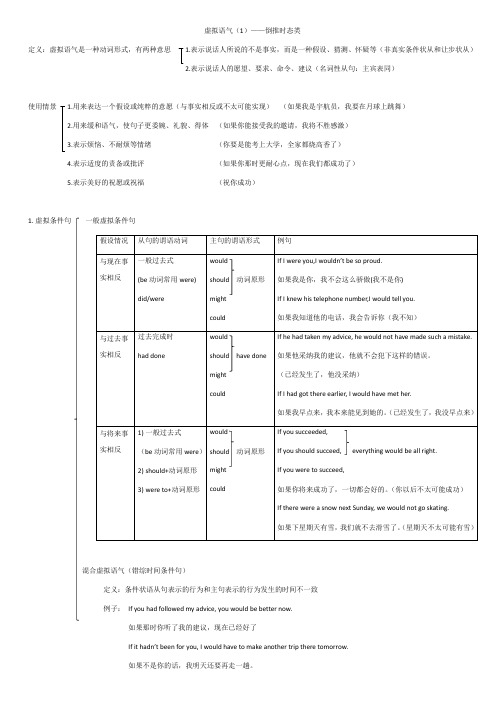
虚拟语气(1)——倒推时态类定义:虚拟语气是一种动词形式,有两种意思 1.表示说话人所说的不是事实,而是一种假设、猜测、怀疑等(非真实条件状从和让步状从)2.表示说话人的愿望、要求、命令、建议(名词性从句:主宾表同)使用情景 1.用来表达一个假设或纯粹的意愿(与事实相反或不太可能实现)(如果我是宇航员,我要在月球上跳舞)2.用来缓和语气,使句子更委婉、礼貌、得体(如果你能接受我的邀请,我将不胜感激)3.表示烦恼、不耐烦等情绪(你要是能考上大学,全家都烧高香了)4.表示适度的责备或批评(如果你那时更耐心点,现在我们都成功了)5.表示美好的祝愿或祝福(祝你成功)1.虚拟条件句一般虚拟条件句混合虚拟语气(错综时间条件句)定义:条件状语从句表示的行为和主句表示的行为发生的时间不一致例子:If you had followed my advice, you would be better now.如果那时你听了我的建议,现在已经好了If it hadn’t been for you, I would have to make another trip there tomorrow.如果不是你的话,我明天还要再走一趟。
If you had studied hard before,you would be a college student now.如果你以前努力学习的话,你现在就是大学生了。
省略+倒装当虚拟条件句的谓语动词中含有were,should,had时,if可以省略,并将were,should,had提前于句首,变为倒装句。
如果虚拟条件句是否定句,not 保留在原处If he should agree to go there, we should send him there.= Should he agree to go there,we should send him there.If she were there,she would agree with us.= Were she were, she would agree with us.If he had learnt about computers,we would have hired him.= Had he learnt about computers,we would have hired him.含蓄虚拟条件句定义:有时为了表达的需要,在虚拟语气中并不总是出现if引导的条件状语从句,而是通过其他手段来代替条件从句分类:1) but for....=(If it+be not for) ;without;Without your help ,we couldn’t have finished the work ahead of time.= But for your help,we couldn’t have finished the work ahead of time.= If it hadn’t been for your help,we couldn’t have finished the work ahead of time.没有你的帮助,我们不可能完成任务。
高考英语二轮专题语法系列--虚拟语气讲义

虚拟语气虚拟语气表示说话人的主观愿望、猜测、建议或与事实不符的假设等,也可以表示可能性较小的情况或不可能发生的情况,而不是客观存在的事实(表示客观事实要用陈述语气)。
虚拟语气是由句中谓语动词的特殊形式表现出来的。
虚拟语气常用于复合句中,也可用于简单句。
比较:If she asks me tomorrow,I shall do it.如果她明天请求我,我会做的。
(陈述语气,说话人认为请求的可能性大)If she asked me tomorrow, I should do it. 假如她明天请求我,我会做的。
(虚拟语气,说话人认为请求的可能性小或不可能请求)1 虚拟语气的用法1-1 虚拟语气用于条件状语从句中1)表示与现在事实相反的情况If I were/was not busy today, I should go with you.如果我今天有空,我会同你一起去的。
If he were/was here,he might talk with you.如果他在这里,他可能会同你谈谈。
If I were you,I wouldn't accept her suggestion.如果我是你,我不会接受她的建议。
If I knew the answer to the question,I should/ would tell you.如果我知道问题的答案,我当然会告诉你。
If we left now, we should/would arrive there in time.如果我们现在就动身,我们会准时到达那里。
If he didn't do exercise every day,he wouldn't be so strong.如果他不每天锻炼,他不会那样强壮的。
If it weren't raining, we would go fishing.要是现在不下雨,我们就去钓鱼了。
虚拟语气用法归纳

虚拟语气用法归纳虚拟语气是指因为某种假设情况而产生的语法现象,用于表示说话人对某种假设情况的态度或假设事件的不确定性。
在汉语中,虚拟语气的用法较为复杂,涉及到多种语法结构和情境。
下面,我将为您归纳虚拟语气的相关内容,并尽可能详细地介绍其用法和注意事项。
一、虚拟语气的基本概念1. 虚拟语气的定义虚拟语气是一种语法现象,用于表示某种虚构、假设或未实现的情况。
在语法上,通过特定的结构和语气词来表达说话人对虚假情况或未发生事件的态度。
2. 虚拟语气的特点虚拟语气通常用于表达非真实的情况,包括假设、愿望、建议、要求等。
其使用涉及到动词、连词、名词、形容词等多个方面,需要根据不同的情景和语境来灵活运用。
二、虚拟语气的主要类型1. 虚拟条件句虚拟条件句表示与事实相反或与现实不符的假设情况,主要包括三种形式:与现在事实相反的虚拟条件句、与过去事实相反的虚拟条件句、与将来事实相反的虚拟条件句。
在语法上,这些虚拟条件句通常使用“要是、如果、假如”等引导词,搭配相应的虚拟语气结构来表示假设情况。
2. 虚拟假设句虚拟假设句用于表示对假设情况的假定或假设,主要包括对现在的假设、对过去的假设、对将来的假设。
在汉语中,虚拟假设句的构成主要通过虚拟语气形式的使用来表达。
3. 虚拟愿望句虚拟愿望句用于表示说话人对未实现愿望或期望的表达,通常通过特定的动词或情态动词搭配虚拟语气来构成。
“但愿我不会迟到”、“要是他健康就好了”。
4. 虚拟命令句虚拟命令句用于表示对未能实现的命令、要求或建议,通常使用“要是、如果”等引导词搭配虚拟语气形式。
三、虚拟语气的使用注意事项1. 上下文语境在使用虚拟语气时,需要根据具体语境来判断是否使用虚拟语气。
通常要根据句子的主语、动作、时间和条件来灵活运用虚拟语气结构。
2. 语气词的运用在汉语中,虚拟语气通常通过特定的语气词来表示,如“要是、如果、假如”等。
在写作和口语表达中,需要注意正确使用这些语气词来构建虚拟语气句子。
虚拟语气英语知识点总结

虚拟语气英语知识点总结一、虚拟语气的概念。
虚拟语气是一种特殊的动词形式,用来表示说话人所说的话不是一个事实,而是一种假设、愿望、怀疑、猜测或建议等。
二、虚拟语气在条件句中的用法。
1. 与现在事实相反的虚拟条件句。
- 结构:从句(If + 主语+ 动词的过去式(be动词一般用were)),主句(主语+ would/should/could/might+动词原形)。
- 例如:If I were you, I would study harder.(如果我是你,我会更努力学习。
实际上我不是你)2. 与过去事实相反的虚拟条件句。
- 结构:从句(If+主语+had+过去分词),主句(主语+would/should/could/might + have+过去分词)。
- 例如:If he had taken my advice, he would have passed the exam.(如果他听了我的建议,他就会通过考试了。
实际上他没听建议,也没通过考试)3. 与将来事实相反的虚拟条件句。
- 结构:从句(If+主语+动词的过去式/should+动词原形/were to+动词原形),主句(主语+would/should/could/might+动词原形)。
- 例如:If it rained tomorrow, we would stay at home.(如果明天下雨,我们就会待在家里。
明天是否下雨还不确定,但这是一种假设情况)- 或者If he should come tomorrow, I would tell him the news.(如果他明天来,我就会告诉他这个消息)- 以及If I were to see her tomorrow, I would give her the book.(如果我明天见到她,我就会把书给她)三、虚拟语气在宾语从句中的用法。
1. wish后的宾语从句。
- 表示与现在事实相反的愿望,从句谓语动词用过去式(be动词用were)。
虚拟语气大全PPT

05
虚拟语气的常见错误
时态错误
总结词
时态错误是虚拟语气中常见的错误之 一,主要表现在时态与虚拟场景不匹 配。
详细描述
在虚拟语气中,时态应与虚拟场景相 符合。例如,在表示与现在事实相反 的虚拟场景时,应使用一般过去时, 而不是一般现在时。
语气词错误
要点一
总结词
语气词错误是指在使用虚拟语气时,语气词的选择不正确 。
虚拟语气在省略句中的用法
虚拟语气在if省略句中的用法
在if省略句中,如果条件状语从句中有were、had、should等词,可以省略if,并把were、had、should等词放 在句首。
虚拟语气在倒装句中的用法
在虚拟语气中,有时需要将谓语动词提前构成倒装句,以强调语气。例如,Were it not for your help, I would not have succeeded.
答案及解析
had read
解析
此题考查虚拟语气中的“if only”结构,表示“要是…… 就好了”。根据句意,应该使用过去完成时表示与过去事 实相反的情况。因此,答案为“had read”。
翻译题练习
翻译题1
如果我是你,我就会去参加那个 聚会。
答案及解析
If I were you, I would go to the party.
06
虚拟语气练习题及解析
选择题练习
选择题1
If it were not for the fact that I _______ busy, I would go with you.
答案及解析
A. am B. were C. will be D. have been
解析
英语虚拟语气知识点

英语虚拟语气知识点(经典版)编制人:__________________审核人:__________________审批人:__________________编制单位:__________________编制时间:____年____月____日序言下载提示:该文档是本店铺精心编制而成的,希望大家下载后,能够帮助大家解决实际问题。
文档下载后可定制修改,请根据实际需要进行调整和使用,谢谢!并且,本店铺为大家提供各种类型的经典范文,如演讲稿、总结报告、合同协议、方案大全、工作计划、学习计划、条据书信、致辞讲话、教学资料、作文大全、其他范文等等,想了解不同范文格式和写法,敬请关注!Download tips: This document is carefully compiled by this editor. I hope that after you download it, it can help you solve practical problems. The document can be customized and modified after downloading, please adjust and use it according to actual needs, thank you!In addition, this shop provides you with various types of classic sample essays, such as speech drafts, summary reports, contract agreements, project plans, work plans, study plans, letter letters, speeches, teaching materials, essays, other sample essays, etc. Want to know the format and writing of different sample essays, so stay tuned!英语虚拟语气知识点虚拟语气一般指说话人的主观愿望或假想,是与客观存在相反的事实,或在现实中无法成真的事情或情形。
高中英语虚拟语气知识点总结
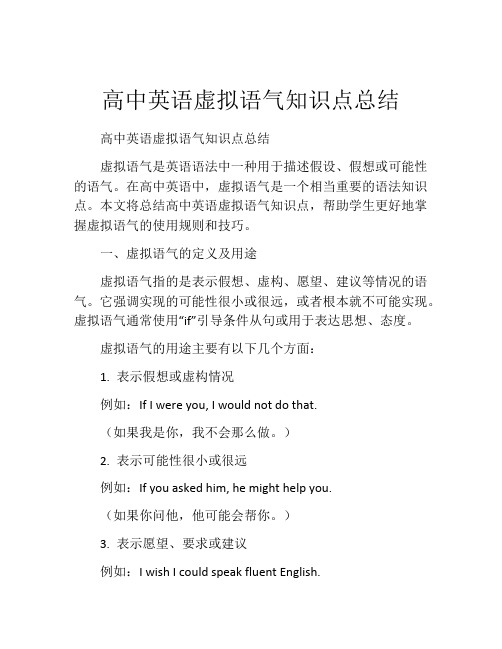
高中英语虚拟语气知识点总结高中英语虚拟语气知识点总结虚拟语气是英语语法中一种用于描述假设、假想或可能性的语气。
在高中英语中,虚拟语气是一个相当重要的语法知识点。
本文将总结高中英语虚拟语气知识点,帮助学生更好地掌握虚拟语气的使用规则和技巧。
一、虚拟语气的定义及用途虚拟语气指的是表示假想、虚构、愿望、建议等情况的语气。
它强调实现的可能性很小或很远,或者根本就不可能实现。
虚拟语气通常使用“if”引导条件从句或用于表达思想、态度。
虚拟语气的用途主要有以下几个方面:1. 表示假想或虚构情况例如:If I were you, I would not do that.(如果我是你,我不会那么做。
)2. 表示可能性很小或很远例如:If you asked him, he might help you.(如果你问他,他可能会帮你。
)3. 表示愿望、要求或建议例如:I wish I could speak fluent English.(我希望我能说流利的英语。
)二、虚拟语气的形式虚拟语气形式主要有以下几种:1. 虚拟语气的过去式:在虚拟语气中,一般用过去式来表示对现在或未来的虚拟。
例如:If I had more time, I would read more books.(如果我有更多时间,我就会多看书。
)2. 虚拟语气的过去完成式:过去完成式用于表示“如果过去已经发生了某些事情,结果会是怎样”。
例如:If I had studied harder in high school, I would have gone to a better college.(如果我在高中时学习更努力,我就能进入更好的大学。
)3. 虚拟语气的“would + 动词原形”形式:“would +动词原形”形式通常用于表示愿望、要求、建议或者可能性。
例如:I wish you would stop smoking.(我希望你戒烟。
)If you would like to come, you are welcome.(如果你愿意来,欢迎你。
虚拟语气练习_讲解[1]
![虚拟语气练习_讲解[1]](https://img.taocdn.com/s3/m/6fbcb491cd22bcd126fff705cc17552707225e25.png)
a.同现在事实相反的假设。
句型:条件从句主句一般过去时should( would) +动词原形If they were here, they would help you.b.表示于过去事实相反的假设。
句型:条件从句主句过去完成时should(would) have+ 过去分词If she had worked harder, she would have succeeded.The rice would not have been burnt if you had been more careful.If my lawyer had been here last Saturday, he would have prevented me from going.If he had come yesterday, I should / would have told him about it.含义:He did not come yesterday, so I did not tell him about it.If he had not been ill and missed many classes, he would have made greater progress.含义:He was ill and missed many lessons, so he did not make greater progress.c.表示对将来的假想句型:条件从句主句一般过去时should+ 动词原形were+ 不定式would + 动词原形should+ 动词原形If you succeeded, everything would be all right.If you should succeed, everything would be all right.If you were to succeed, everything would be all right.混合条件句主句与从句的动作发生在不同的时间,这时主,从句谓语动词的虚拟语气形式因时间不同而不同,这叫做混合条件句。
高考英语语法_虚拟语气详解_练习精讲[1]
![高考英语语法_虚拟语气详解_练习精讲[1]](https://img.taocdn.com/s3/m/a0a87db1d5d8d15abe23482fb4daa58da0111c8a.png)
虚拟语气陈述语气:表示动作或状态是现实的、确定的或符合事实的,用于陈述句、疑问句和某些感叹句。
如:0-0There are two sides to every question./ 0-1Were you busy all day yesterday?祈使语气:表示说话人对对方的请求或命令。
如:0-2Never be late again!/ 0-3Don’t forget to turn off the light.虚拟语气:表示动作或状态不是客观存在的事实,而是说话人的主观愿望、假设或推测等。
如:0-4If I were a bird, I could fly in the air.一真实条件与非现实条件真实条件表示现实情况中可能实现的情况而非真实条件表示与现实情况相反的假想。
1-1 If the working conditions are not too bad, I will accept the job.如果工作条件不太差,我会接受这项工作。
(真实条件)1-2 If the working conditions were not too bad, I would accept the job.如果工作条件不太差,我就接受这项工作了。
(非真实条件)(事实是The working conditions are too bad,、I won't accept the job)1-3 He said if he failed, he would have another try.他说他如果失败,他还会再试一次。
(真实条件)1-4 If he had failed, he would have had another try.如果他失败的话,他会再试一次的。
(非真实条件)(事实是He didn't fail and he didn't have another try.二非真实条件句2.1 if条件状语从句中的虚拟语气should可用于各种人称,且不可以被would所代替。
虚拟语气的三种情况
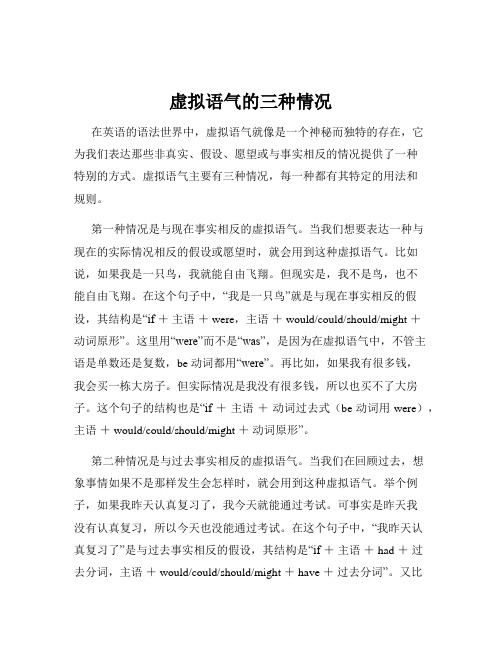
虚拟语气的三种情况在英语的语法世界中,虚拟语气就像是一个神秘而独特的存在,它为我们表达那些非真实、假设、愿望或与事实相反的情况提供了一种特别的方式。
虚拟语气主要有三种情况,每一种都有其特定的用法和规则。
第一种情况是与现在事实相反的虚拟语气。
当我们想要表达一种与现在的实际情况相反的假设或愿望时,就会用到这种虚拟语气。
比如说,如果我是一只鸟,我就能自由飞翔。
但现实是,我不是鸟,也不能自由飞翔。
在这个句子中,“我是一只鸟”就是与现在事实相反的假设,其结构是“if +主语+ were,主语+ would/could/should/might +动词原形”。
这里用“were”而不是“was”,是因为在虚拟语气中,不管主语是单数还是复数,be 动词都用“were”。
再比如,如果我有很多钱,我会买一栋大房子。
但实际情况是我没有很多钱,所以也买不了大房子。
这个句子的结构也是“if +主语+动词过去式(be 动词用 were),主语+ would/could/should/might +动词原形”。
第二种情况是与过去事实相反的虚拟语气。
当我们在回顾过去,想象事情如果不是那样发生会怎样时,就会用到这种虚拟语气。
举个例子,如果我昨天认真复习了,我今天就能通过考试。
可事实是昨天我没有认真复习,所以今天也没能通过考试。
在这个句子中,“我昨天认真复习了”是与过去事实相反的假设,其结构是“if +主语+ had +过去分词,主语+ would/could/should/might + have +过去分词”。
又比如,如果他当时听了我的建议,就不会犯那个错误了。
但过去他没有听我的建议,所以犯了错。
这也是与过去事实相反的虚拟语气,遵循同样的结构。
第三种情况是与将来事实相反的虚拟语气。
这种情况通常是对未来可能发生但不太可能实现的情况进行假设。
比如,如果明天天下雨,我们就取消旅行。
但实际上明天是否下雨还不确定,只是一种假设。
其结构有两种,一种是“if +主语+ were to +动词原形,主语+would/could/should/might +动词原形”,另一种是“if +主语+ should +动词原形,主语+ would/could/should/might +动词原形”。
高中英语虚拟语气练习题(附答案)[1]
![高中英语虚拟语气练习题(附答案)[1]](https://img.taocdn.com/s3/m/82b82daa0029bd64783e2c77.png)
虚拟语气专练1. If only he ____quietly as the doctor instructed, he would not suffer so much now.A. liesB. layC. had lainD. should lie2. You did not let me drive. If we ____in turn, you ____ so tiredA. drove; didn’t getB. drove; wouldn’t getC. were driving; wouldn’t getD. had driven ; wouldn’t have got3. _____it rain tomorrow, we would have to put off the visit to the Yangpu BridgeA. WereB. ShouldC. WouldD. Will4. I suggested the person _____ to be put into prisonA. refersB. referringC. referredD. refer5. ---Your aunt invites you to the movies today---I had rather she ____ me tomorrow than todayA. tellsB. toldC. would tellD. had told6. I was ill that day, otherwise I ____ the sports meetA. would have taken part inB. took part inC. had taken part inD. would take part in7. He ____busy yesterday, or he ___you with your experiment.A. was, had helpedB. was, would have helpedC. had been, would have helpedD. were, would have helped8. Without electricity, human life ____quite difficult todayA. isB. will beC. would have beenD. would be9. The kind-hearted couple treat the orphan very well as though he ____ their own son.A. isB. wereC. had beenD. should be10. How the old people wish that they ____young once moreA. wereB. could becomeC. had beenD. should be11. If I had had enough time, I___ my work.A. would finishB. must have finishedC. would have finishedD. had finished12.Ten minutes earlier, they ___ the plane.A. will catchB. would catchC. would have caughtD. will have caught13. Mr Green requires that the students ___ a composition every other week.A. writeB. writtenC. would writeD. will write14.Had he studied hard, he___ the exam.A. would passB. could passC. had passedD. would have passed15.I wish I ___ what is happening there in his room.A. knowB. knownC. knewD. should know16.If there were no water in the world, everything ___.A. will dieB. would dieC. would have diedD. would have been dead17. ___ what was going to happen, I would never have left her alone.A. Had I knownB. If I knowC. If I knewD. If had I known18.He ordered that the work ___ right away.A. should finishB. finishedC. would be finishedD. be finished19.—Shall we go to the movie tonight?—No, I'd rather ___ at home with our baby. You'd better not leave it to the babysitter at night.A. you stayedB. you stayC. stayedD. stay20. ___ in your position, I would help him.A. Was IB. Were IC. If I amD. If I had been21.I ___, but I was stopped by the heavy rain.A. mean to comeB. meant to comeC. had meant to comeD. meant coming22.Mrs Black insists___ in that old hotel.A. not to stayB. not stayingC. staying notD. that she not stay23.If you had spoken clearly, you would___.A. understand itB. have understoodC. be understoodD. have been understood24. If you ___ that late movie last night, you wouldn't be so sleepy.A. haven't watchedB. hadn't watchedC. didn't watchD. wouldn't have watched25. The teacher demanded that the exam _____ before eleven.A. must finishB. would be finishedC. be finishedD. must be finished26. She made the demand that the journalists _____ at once ______ Iraq.A. leave; forB. leave; toC. left; toD. to be left; for27. The suggestion has been made _____ the basketball game _____ put off.A. for; toB. that; beC. which; should beD. to; being28. The order came that the medical supplies _____ to Beijing for the Sars soon.A. would be sentB. should sendC. be sentD. must be sent29. Had you listened to the doctor, you _____ all right now.A. areB. wereC. would beD. would have been30. _____ any change about the date, please tell me immediately.A. Will there beB. Should there beC. There will beD. There should be31. _____ today, he would get there by Friday.A. Would he leaveB. Was he leavingC. Were he to leaveD. If he leave32. Should it rain, the crops _____ .A. would be savedB. would have been savedC. will be savedD. had been saved33. You _____ come earlier. The bus left a moment ago.A. wouldB. should haveC. mayD. have34. I _____ you some money, but I hadn’t any on me then.A. would lendB. would have lentC. could lendD. may have lent35. --- “Hav e you ever been to Beijing?”--- “No, but I wish I _____”A. haveB. willC. doD. had36. I’m glad I went over all my notes; otherwise _____ .A. I may have failedB. I’d failC. I’d have failedD. I’ll have failed37. --- “What will you do during the summer holiday?”--- “I don’t know, but it’s high time _____ something.”A. I’m decidingB. I’ll decideC. I decidedD. I decide38. What would we do if it _____ tomorrow?A. should snowB. would snowC. snowD. will snow39. If only I _____ my watch!A. hadn’t lostB. haven’t lostC. didn’t lostD. don’t lose40. You _____ such a serious mistake if you had followed his advice.A. may not makeB. might not makeC. shouldn’t have madeD. might not have made41. We _____ the work on time without your help.A. hadn’t had finishedB. didn’t have finishedC. couldn’t have finishedD. can’t have finished42. --- “Where have you been?”--- “I got caught in traffic; otherwise _____ sooner.”A. I would be hereB. I have been hereC. I had been hereD. I would have been here43. If it were not for the fact that you _____ ill, I would ask you to do this right n ow.A. wereB. had beenC. areD. should be44. I’d rather you ___ right away.A. leaveB. leftC. will leaveD. to leave45. He is working hard for fear that he ___.A. failsB. failedC. would failD. fail46. The teacher agreed to the suggestion that the students ___ two weeks to prepare for the exam.A. giveB. should giveC. be givenD. would be given47. I was busy yesterday, otherwise I ___ your birthday party.A. attendedB. had attendedC. would attendD. would have attended48. The two strangers talked as if they ___ friends for years.A. wereB. would beC. have beenD. had been49. We ___ our lives had it not been for the policeman.A. would have lostB. should loseC. might loseD. could have lost50. ---- I thought you would come back tomorrow.---- I would if I ___ to attend a meeting.A. don’t haveB. didn’t haveC. will not haveD. would not have51. It ___ very nice if only it were possible.A. will beB. would beC. isD. were52. Without your help, our team ___ the last match.A. won’t winB. will loseC. wouldn’t have wonD. can’t win53. ___, I would take an umbrella with me.A. Had I been youB. I were youC. Were I youD. I had been you54. If I had hurried, I ___ the train.A. would catchB. could catchC. would have caughtD. had caught55. Tom insisted that John ___ it for no one was in the room except him.A. doB. doesC. didD. would do56. If I had known that, I ___ so.A. wouldn’t doB. wouldn’t have doneC. won’t doD. have not done57. The doctor proposed that she ___.A. will not smokeB. not smokeC. would not smokeD. did not smoke58. If I ___ you, I wouldn’t return the call.A. beB. amC. wasD. were59. If the doctor had been available, the child ___.A. would not dieB. would not have diedC. could not dieD. could not have died60. Dr. Bethune worked hard as if he ___.A. never had felt tiredB. had never felt tiredC. never felt tiredD. was tired never。
虚拟语气用法

虚拟语气用法虚拟语气,又称“虚拟假设语气”,是指说话者或写作者在表达某种情况时,通过使用特定的语法形式来表示这种情况实际上并不存在或者与事实相反。
虚拟语气在英语中非常常见,它可以用来表达假设、愿望、建议、命令、推测等多种语境。
本文将介绍虚拟语气的各种用法及例句。
一、假设与现实相反的情况虚拟语气常用于表示与现实相反的情况或假设。
在这种情况下,谓语动词常以“would/could/should + 动词原形”或“were + 主语”等形式出现。
1. 虚拟语气用于假设:If I were rich, I would travel around the world.如果我有钱,我会环游世界。
If she had studied harder, she could have passed the exam.如果她学得更努力,她本来可以通过考试的。
2. 虚拟语气用于愿望:I wish I were taller.我希望我更高一些。
I wish you wouldn't be late for the meeting.我希望你不要迟到开会。
3. 虚拟语气用于建议:I suggest that he should see a doctor.我建议他去看医生。
It is recommended that every student study English.建议每个学生都学习英语。
二、与过去事实相反的情况虚拟语气还常用于表示与过去事实相反的情况。
在这种情况下,主要使用“had + 过去分词”形式或其他相应的虚拟语气结构。
1. 虚拟语气用于与过去事实相反的条件:If he had arrived earlier, he would have caught the train.如果他早点到,他就能赶上火车了。
If I had known you were coming, I would have prepared dinner.如果我知道你要来,我就会准备晚餐了。
虚拟语气的用法和常见表达方式总结

虚拟语气的用法和常见表达方式总结虚拟语气是一种特殊的语气形式,用来表示说话人的主观愿望、假设、怀疑、命令、建议等非现实或未实现的情况。
在语法上,虚拟语气与实际情况相反,常常用于条件句、表达愿望、建议或是疑问等场景。
本文将总结虚拟语气的用法和常见表达方式,以帮助读者更好地理解和运用。
虚拟语气的用法一:表示与现实相反的假设1. 条件句中的虚拟语气在表示与现实相反的假设情况下,常用“如果”、“要是”等引导词引导条件句。
在这种情况下,主句中的谓语动词需使用虚拟语气形式。
例如:如果我是你,我会早点睡觉。
(表示与现实相反的假设)要是明天下雨,我们就不去郊游了。
2. 表达愿望或建议的虚拟语气虚拟语气可以用来表达说话人的愿望、建议或期待。
常用“希望”、“愿意”、“要求”等词语来引导虚拟语气。
例如:我希望你能理解我的困扰。
我要求你们准时参加会议。
3. 表示命令、建议或要求的虚拟语气虚拟语气可以在表示命令、建议或要求时使用,常用“要求”、“建议”、“命令”等引导词来引导虚拟语气。
例如:我建议你明天早点来上班。
我命令你立刻停止打架。
虚拟语气的用法二:表示对过去事件的假设1. 表示对过去事件的虚拟语气虚拟语气在表示对过去事件的假设时,常通过使用“如果”加上过去完成时的虚拟语气。
例如:如果我当初选了理科,现在就不会后悔了。
要是我没有迟到,老师就不会生气了。
2. 表示对过去行为的懊悔与后悔当我们对过去的行为感到懊悔或后悔时,可以使用虚拟语气来表达这种情绪。
例如:要是我早点听从父母的劝告,就不会犯那么多错误了。
虚拟语气的用法三:表示建议、要求或推测1. 表示建议、要求或推测的虚拟语气虚拟语气可以用来表示建议、要求或推测的情况。
常用“要求”、“建议”、“推测”等引导词语来引导虚拟语气。
例如:我建议你今天早点休息。
我推测他可能已经离开了。
2. 表示对不可能实现的要求虚拟语气也可以用于表示对不可能实现的要求。
常用“要求”、“期望”等引导词语来引导虚拟语气。
虚拟语气讲解课件

二、虚拟语气用于宾语从句中
Wish 的宾语从句
现在: 过去: 未来:
过去时(were)
过去完成时
would/could/might+V.
I wish I were a bird I wish I hadn’t made such a mistake We wish our parents wouldn’t punish us.
a party for you . a full mark next time,
I ________
____________ ____________ ____________
Were to get
现在事实相反
If I were you, I would give AIDS patient a hug. If I had taken your advice, I wouldn’t have made a mistake. If it rained tomorrow, they wouldn’t go for an outing.
Eg : We met in this room .
陈述语气 Do come to the meeting next Friday .
祈使语气 If I were you , I would study hard .
什么是虚拟语气

什么是虚拟语气?虚拟语气(Subjunctive Mood)是英语中的一种语气,用于表达假设、愿望、建议、命令和怀疑等非真实或不确定的情况。
虚拟语气在英语中的使用相对较少,但在特定的语境和句型中非常重要。
下面是虚拟语气的一些常见用法:1. 假设:虚拟语气用于表达与现实相反的假设情况。
这种用法通常出现在条件句中,表示与现实相反或不确定的情况。
- If I were rich, I would travel the world.(与现实相反的假设情况)- If it were to rain, we would cancel the picnic.(不确定的假设情况)2. 愿望和要求:虚拟语气用于表达愿望、要求或建议。
这种用法通常出现在动词后面的从句中。
- I wish I were taller.(对现实的愿望)- She demanded that he leave immediately.(对他人的要求)- It is recommended that he take a break.(对他人的建议)3. 命令和建议:虚拟语气用于表示命令、建议或要求。
这种用法通常出现在动词后面的从句中。
- The teacher insisted that the students be quiet.(对学生的命令)- I suggest that you go to bed early.(对他人的建议)- It is important that he arrive on time.(对他人的要求)4. 怀疑和可能性:虚拟语气用于表示怀疑、不确定或可能性。
这种用法通常出现在动词后面的从句中。
- I doubt that she be telling the truth.(对她说的话的怀疑)- It is possible that he have forgotten the meeting.(对他可能忘记会议的可能性)虚拟语气在英语中的使用相对较复杂,需要根据具体的语境和句型进行判断。
虚拟语气_精品文档

3. His _d_is_a_p_p_o__in_t_e_d (disappoint) look suggested that he _h_a_d__fa_i_le_d___ (fail) to pass the test.
表示与事实 条件从句的谓语 主句的谓语形式 情况相反 形式
表示现在情 过去式(did)
况
(be常用 were)
Would / could / might / should
表示过去情 过去完成式(had 上面4个情态动词
况
+done
+have done
表示将来情 ①过去式 (did)
况
②should + do
6. The gloomy weather suggests we _w_i_ll___ (have) rainly day tomorrow.
5. 在would (had) rather(宁愿) 引导的宾语 从句中
当从句表示现在或将来的时间时,谓语动词 要用一般过去时;表示过去时间时,谓语动 词要用过去完成时。
4. I insist he _n_o_t__b_e_c_h_o_s_e_n_ (not choose) as a team member on account of his small size.
5. The witness insisted that he _h_a_d__s_e_e_n (see) a person climb through the window.
英语虚拟语气(一)解题方法和技巧及练习题及解析
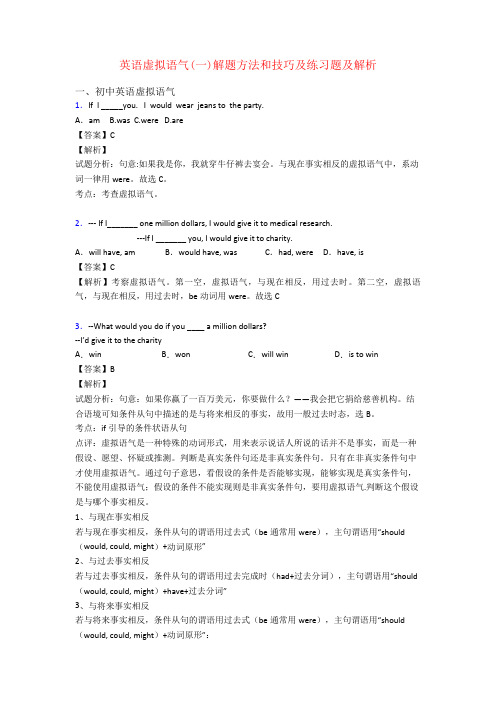
一般过去时,主句中用 would+动词的原形。故选 D。
考点:考查虚拟语气。
30.I’ m so busy. If I time, I travel around. A.have; would B.have; could C.had; would D.had; will 【答案】C 【解析】 试题分析:虚拟语气是一种特殊的动词形式,用来表示说话人所说的话并不是事实,而是
25.If I you, I’d keep quiet and listen carefully in class.
A.am
B.will be
C.were
【答案】C
【解析】
试题分析: 与现在事实相反:条件从句用动词过去式,主句用 would/could/should/might+
动 词 原 形 ; 与 过 去 事 实 相 反 : 条 件 从 句 用 had done , 主 句 用
考点:考查虚拟语气。
28.If I a boss, I would manage a big factory. A.are B.was C.were D.be 【答案】C 【解析】 试题分析:句意:如果我是老板,我会经营一家大型工厂。由句意可知,此句是虚拟语 气,if 引导的从句应该用过去式的形式,其中第一人称用 were,故答案为 C。 考点:考查虚拟语气。
假设、愿望、怀疑或推测。判断是真实条件句还是非真实条件句。只有在非真实条件句中
才使用虚拟语气。通过句子意思,看假设的条件是否能够实现,能够实现是真实条件句,
不能使用虚拟语气;假设的条件不能实现则是非真实条件句,要用虚拟语气.判断这个假设
是与哪个事实相反。
1、与现在事实相反
若与现在事实相反,条件从句的谓语用过去式(be 通常用 were),主句谓语用“should
虚拟语气知识点总结
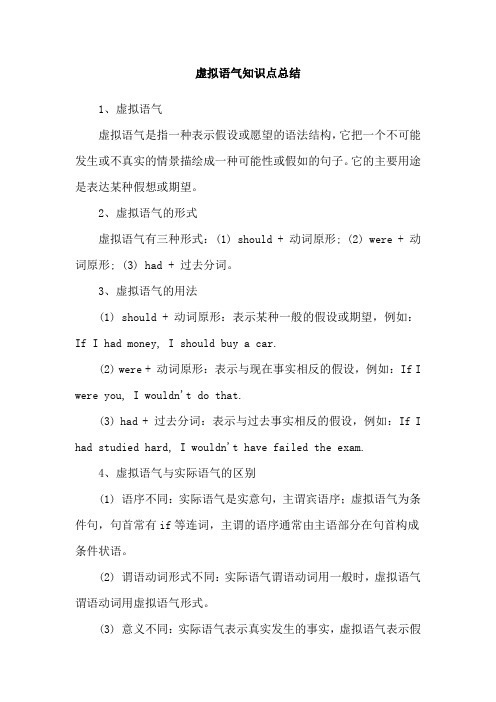
虚拟语气知识点总结
1、虚拟语气
虚拟语气是指一种表示假设或愿望的语法结构,它把一个不可能发生或不真实的情景描绘成一种可能性或假如的句子。
它的主要用途是表达某种假想或期望。
2、虚拟语气的形式
虚拟语气有三种形式:(1) should + 动词原形; (2) were + 动词原形; (3) had + 过去分词。
3、虚拟语气的用法
(1) should + 动词原形:表示某种一般的假设或期望,例如:If I had money, I should buy a car.
(2) were + 动词原形:表示与现在事实相反的假设,例如:If I were you, I wouldn't do that.
(3) had + 过去分词:表示与过去事实相反的假设,例如:If I had studied hard, I wouldn't have failed the exam.
4、虚拟语气与实际语气的区别
(1) 语序不同:实际语气是实意句,主谓宾语序;虚拟语气为条件句,句首常有if等连词,主谓的语序通常由主语部分在句首构成条件状语。
(2) 谓语动词形式不同:实际语气谓语动词用一般时,虚拟语气谓语动词用虚拟语气形式。
(3) 意义不同:实际语气表示真实发生的事实,虚拟语气表示假
设或期望。
- 1、下载文档前请自行甄别文档内容的完整性,平台不提供额外的编辑、内容补充、找答案等附加服务。
- 2、"仅部分预览"的文档,不可在线预览部分如存在完整性等问题,可反馈申请退款(可完整预览的文档不适用该条件!)。
- 3、如文档侵犯您的权益,请联系客服反馈,我们会尽快为您处理(人工客服工作时间:9:00-18:30)。
分词的用法
• 分词是非限定性动词的一种,即它不能单 独用作句子的谓语,而是充当句子的辅助 成分。 • 分词可以分为一般时现在分词、完成时现 在分词和过去分词,它的规则变化是由动 词加-ing或-ed 变化而来,因此分词的一个 显著特点是具有动作性。
分词做定语
• 1.根据时态、语态不同 • 1.1现在分词的一般式表示分词动作正在进行或保 持的一种状态。 • 1)a flying plane 一架正在飞行的飞机 • 2) a room facing the south 朝南的房间 • 1.2过去分词用来表示已经完成的动作或被动的意 思。 • 1)a story written by Mark Twain. • 2) a bridge built in 1930.
• 3.___ a raining day, we gave up our plan to go for an outing. • A. With it b. Being • C. Because it being d. It being • 4. ___ in Beijing for quite a few years, Mr. Park had little difficulty understanding Chinese. • A. Having lived b. lived • C. living d. To live
2.用在表示要求、建议、命令等的名词从句 中 从句谓语形式为:“...(should ) + do sth.”(在 美语中should常省去)。类似用法的动词有: insist,suggest,order,propose,demand, command ,advise,desire,request,require, ask,prefer,recommend(推荐),arrange (安排),advocate(拥护、提倡),maintain (坚决主张)等后面的宾语从句中。
虚拟语气 历年真题中涉及到虚拟语气的 考点可以归纳如下: (1)(should)+动词原形的情形;
(2)if或but for等引导的条件句;
(3)wish, if only, would rather, It is(high)time that„的用法。
ห้องสมุดไป่ตู้
1.由 “ if ”引导的虚拟句子 (1)与现在的事实相反:(If ... + were/did...,...+ would do...) If I were you, I would marry him. 如果我是你,就 会嫁给他。 (2)与过去的事实相反:(If ... + had done..., ... +would have done...) If you had worked hard, you would have passed the exam. 如果你用功学习,就会通过考试了。 (3)与将来的事实可能相反:(If ...+ should do...,...+ would do...) If it should rain tomorrow, what would you do? 如 果明天下雨,你怎么办?
• 1.from the dates ____ on the plates, we decided that they were made in Song Dynasty. • A. marking b. having been marked • C. marked d. to be marked • 2. ___ to meet any body, he went in from the back door. • A. not wishing b. wishing • C. not wished d. no wishing
分词做状语
• 1. 表示谓语动作发生时的伴随状况、行为 方式 • He ran to me, holding a letter in his hand. • Accompanied by his friends, he went to the railway station.
• 2.表示时间, 可用来表示同时或顺序发生 的动作,相当于when, after等引导的时间状 语从句。 • seeing this , we became worried. • When we saw this , we became worried.
2.分词与定语从句的互换性
• 当分词做定语并与其修饰的名词之间有主 谓关系或动宾关系时,该分词可视作一个 省略关系代词的定语从句。 • 1)people living in this area speak French. • People who live in this area speak French. • 2) the stone bridge built in 1940 is still in good condition. • The stone bridge which was built in 1940 is still in good condition.
1.But for his help, I _____________________(我不 可能这么早完成). 答案: would not have finished so early
2.Some women ___________________(本来能够挣 一份很好的工资) in a job instead of staying home, but they decided not to work for the sale of the family. 答案:could have made a good salary.
• 3.表示原因、背景,相当于because从句 • Not having received a reply, he decided to write again.
• 完成式现在分词更强调分词动作发生在谓 语动作之前。
• 独立主格形式 • 当分词短语带有自己独立的逻辑主语,与 主句的主语无关时,称为独立主格,being 在独立主格中常常被省略。 • Weather permitting, we shall go to the city park. • He came into the room, his face (being) red with cold.
3.用在“It + be + important (necessary, natural, essential, strange, amazing, annoying, desirable, surprising, vital, advisable, anxious, compulsory, crucial, eager, possible, impossible, improper, probable, preferable, strange, urgent等,以 及insisted, suggested, ordered, requested, arranged, recommended等) + that ...”结构 中的that 引导的主语从句中。
【真题】The victim __________(本来会有机 会活下来)if he had been taken to hospital in time.(2006.12) 【答案】would have had a chance to survive/would have had a chance of survival
6.1est方式状语从句中的虚拟语气 从句用should+原形或直接用原形,不受主句动 词时态的任何影响。
• 【真题】You would not have failed if__________(按照我的指令去做).(2009.12) • 【解析】本题考点有两个:首先最重要的考点是if 从句的虚拟语气考查;根据语法规定,如果主句中出 现would +have的形式,从句中应该采用had+过去 分词的结构;第二是固定搭配“按照…的指令”表达 为follow my instructions 或者是follow my orders 注意多样化的表达,两者选其一就可以;注 意很多学生出现遗漏主语you,造成不必要的失分。 • 【答案】you had followed my instructions 或者 you had followed my orders
• • • •
A sleeping boy 睡着的男孩 A waiting taxi 候客的出租车 A sleeping berth 卧铺 A waiting room 候车室
4. 分词与不定式做定语的比较
• 分词表示动作在进行中或已经完成,不定 式表示动作将要发生。 • The news being broadcast • 正在广播的新闻 • The news to be broadcast • 将要广播的新闻
4.用在It is time that ... 结构中,表示“该干某事了”, 含建议的意思,用动词过去式。It is time (that) we went to bed. 咱们该睡觉了。 注意: time 前可加about(表示“大约”)或high(表 示“强调”)等。 5.wish后宾语从句中的虚拟语气 从句用一般过去时或过去进行时表示一种与现在事 实相反的愿望:用过去完成时或过去完成进行时表 示与过去事实相反的愿望:若用would则表示请求 或对现状不满希望将来有所改变等。If only的用法 和I wish等基本相同,只是更富有感情色彩。
3.分词与动名词做定语的比较
• 分词做定语,它与被修饰名词肯定存在主 谓关系或动宾关系。 • A running train-----the train is running • The problem left----the problem is left • 动名词做定语,主要说明被修饰的名词的 用途、目的、特性等。 • Drinking water
